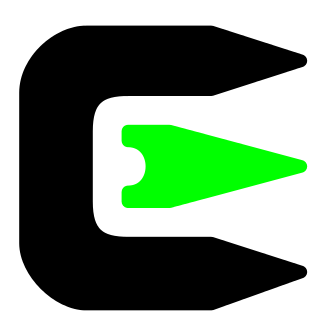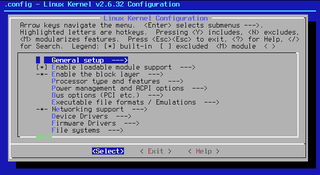The Artistic License is an open-source license used for certain free and open-source software packages, most notably the standard implementation of the Perl programming language and most CPAN modules, which are dual-licensed under the Artistic License and the GNU General Public License (GPL).

Cygwin is a Unix-like environment and command-line interface for Microsoft Windows. Cygwin's purpose is expressed in its motto: "Get that Linux feeling – on Windows".

Free software or libre software is computer software distributed under terms that allow users to run the software for any purpose as well as to study, change, and distribute it and any adapted versions. Free software is a matter of liberty, not price; all users are legally free to do what they want with their copies of a free software regardless of how much is paid to obtain the program. Computer programs are deemed "free" if they give end-users ultimate control over the software and, subsequently, over their devices.

The GNU Lesser General Public License (LGPL) is a free-software license published by the Free Software Foundation (FSF). The license allows developers and companies to use and integrate a software component released under the LGPL into their own software without being required by the terms of a strong copyleft license to release the source code of their own components. However, any developer who modifies an LGPL-covered component is required to make their modified version available under the same LGPL license. For proprietary software, code under the LGPL is usually used in the form of a shared library, so that there is a clear separation between the proprietary and LGPL components. The LGPL is primarily used for software libraries, although it is also used by some stand-alone applications.

ncurses is a programming library providing an application programming interface (API) that allows the programmer to write text-based user interfaces (TUI) in a terminal-independent manner. It is a toolkit for developing "GUI-like" application software that runs under a terminal emulator. It also optimizes screen changes, in order to reduce the latency experienced when using remote shells.

UseModWiki is a wiki software written in Perl and licensed under the GNU General Public License. Pages in UseModWiki are stored in ordinary files, not in a relational database. Wikipedias in English and many other languages were powered by UseModWiki until switching to MediaWiki.
The Q Public License (QPL) is a non-copyleft license, created by Trolltech for its free edition of the Qt. It was used until Qt 3.0, as Trolltech toolkit version 4.0 was released under GPL version 2.
The Open Software License (OSL) is a software license created by Lawrence Rosen. The Open Source Initiative (OSI) has certified it as an open-source license, but the Debian project judged version 1.1 to be incompatible with the DFSG. The OSL is a copyleft license, with a termination clause triggered by filing a lawsuit alleging patent infringement.
MinGW, formerly mingw32, is a free and open source software development environment to create Microsoft Windows applications.
A GPL linking exception modifies the GNU General Public License (GPL) in a way that enables software projects which provide library code to be "linked to" the programs that use them, without applying the full terms of the GPL to the using program. Linking is the technical process of connecting code in a library to the using code, to produce a single executable file. It is performed either at compile time or run-time in order to produce functional machine-readable code. The Free Software Foundation states that, without applying the linking exception, a program linked to GPL library code may only be distributed under a GPL-compatible license. This has not been explicitly tested in court, but linking violations have resulted in settlement. The license of the GNU Classpath project explicitly includes a statement to that effect.
FreeTDS is a free software programming library, a re-implementation of the Tabular Data Stream protocol. It can be used in place of Sybase's db-lib or ct-lib libraries. It also includes an ODBC library. It allows many open source applications such as Perl and PHP to connect to Sybase ASE or Microsoft SQL Server.

Doxygen is a documentation generator and static analysis tool for software source trees. When used as a documentation generator, Doxygen extracts information from specially-formatted comments within the code. When used for analysis, Doxygen uses its parse tree to generate diagrams and charts of the code structure. Doxygen can cross reference documentation and code, so that the reader of a document can easily refer to the actual code.
GNU Readline is a software library that provides in-line editing and history capabilities for interactive programs with a command-line interface, such as Bash. It is currently maintained by Chet Ramey as part of the GNU Project.

LAMP is an acronym denoting one of the most common software stacks for many of the web's most popular applications. However, LAMP now refers to a generic software stack model and its components are largely interchangeable.
The Affero General Public License is a free software license. The first version of the Affero General Public License (AGPLv1), was published by Affero, Inc. in March 2002, and based on the GNU General Public License, version 2 (GPLv2). The second version (AGPLv2) was published in November 2007, as a transitional license to allow an upgrade path from AGPLv1 to the GNU Affero General Public License.

A free-software license is a notice that grants the recipient of a piece of software extensive rights to modify and redistribute that software. These actions are usually prohibited by copyright law, but the rights-holder of a piece of software can remove these restrictions by accompanying the software with a software license which grants the recipient these rights. Software using such a license is free software as conferred by the copyright holder. Free-software licenses are applied to software in source code and also binary object-code form, as the copyright law recognizes both forms.

Copyleft is the legal technique of granting certain freedoms over copies of copyrighted works with the requirement that the same rights be preserved in derivative works. In this sense, freedoms refers to the use of the work for any purpose, and the ability to modify, copy, share, and redistribute the work, with or without a fee. Licenses which implement copyleft can be used to maintain copyright conditions for works ranging from computer software, to documents, art, scientific discoveries and even certain patents.

The GNU General Public License is a series of widely used free software licenses that guarantee end users the four freedoms to run, study, share, and modify the software. The license was the first copyleft for general use and was originally written by the founder of the Free Software Foundation (FSF), Richard Stallman, for the GNU Project. The license grants the recipients of a computer program the rights of the Free Software Definition. These GPL series are all copyleft licenses, which means that any derivative work must be distributed under the same or equivalent license terms. It is more restrictive than the Lesser General Public License and even further distinct from the more widely used permissive software licenses BSD, MIT, and Apache.
The following outline is provided as an overview of and topical guide to the Perl programming language:
The following outline is provided as an overview of and topical guide to MySQL:









